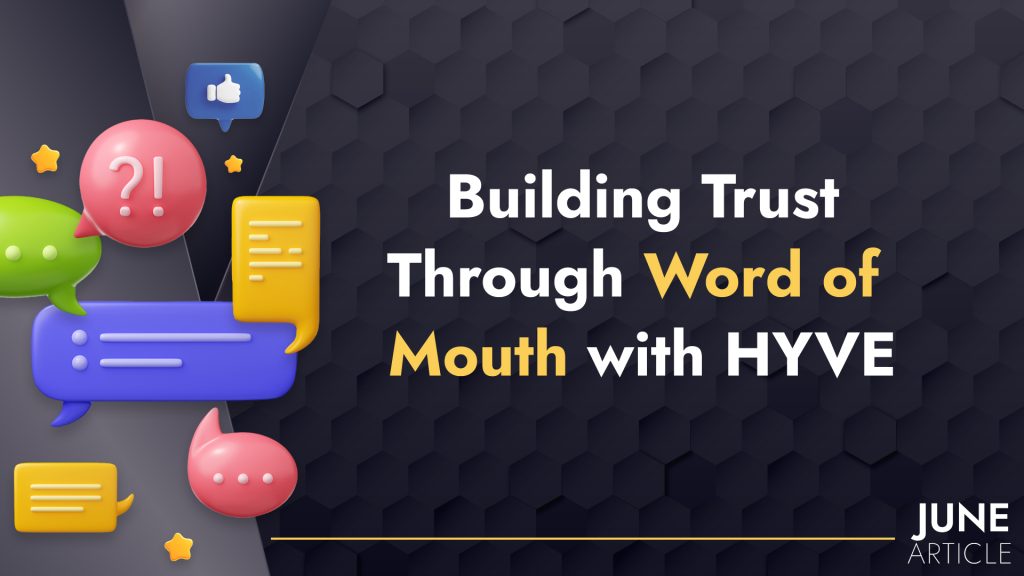


In the world of marketing, trust is a currency. It is the foundation of all successful business relationships, especially when it comes to meeting consumer needs. One of the most effective ways to build this trust is through word of mouth. While online reviews, social media, and other reputation management tools are important, research has shown that a personal, in-person endorsement from someone you know and trust can be even more impactful.
The “Rule of 3 and 33” suggests that it takes an average of three positive word-of-mouth instances to overcome one negative instance, and it takes 33 positive experiences to make up for one negative experience. This underscores the power of word of mouth and the importance of consistently delivering exceptional experiences.
An age-old marketing strategy, word of mouth goes beyond merely spreading information. It involves sharing personal experiences, recommendations, and opinions, creating a buzz that resonates with potential customers. For local businesses, word of mouth can be particularly impactful, helping to establish a strong presence and foster lasting relationships within the community. But how can businesses effectively leverage word of mouth to generate excitement and trust around their products or services? In this article, we’ll explore the power of word of mouth in building trust and relationships, and provide actionable approaches for businesses to harness this potent marketing tool.
Word of mouth is a potent force in the marketing world, more than just casual conversations between friends or family. It is a form of social proof. When people hear positive things about a business from someone they trust, they are more likely to believe it. This trust can significantly influence their decision-making process, swaying them towards choosing one product or service over another.
Here are some key reasons why word of mouth is so powerful in marketing:
– Authenticity and Credibility: People trust the opinions of their peers more than any advertisement.
– Influence: Positive word of mouth can significantly impact consumer behavior.
– Cost-effectiveness: Unlike paid advertising, word of mouth is essentially free.
– Virality: Good news travels fast, especially in the digital age.
– Longevity: Positive experiences shared through word of mouth can leave a lasting impression.
In essence, word of mouth can be a game-changer for businesses. It can help build trust, attract new customers, and foster loyalty.
The power of word of mouth lies in its psychological underpinnings. It taps into our innate desire to share experiences and seek validation from others. When we have a positive experience with a product or service, we want to share it with others, hoping they will benefit too. Conversely, if we have a negative experience, we feel compelled to warn others.
This sharing of experiences is not just about helping others; it is also about reinforcing our own choices. When others validate our experiences, it makes us feel good about our decisions. Moreover, word of mouth can create a sense of belonging, strengthening our social bonds when we share our experiences with others.
Customer satisfaction plays a crucial role in generating positive word of mouth. Happy customers are more likely to share their positive experiences, helping businesses build strong relationships with their clientele. Here are some key ways customer satisfaction can foster positive word of mouth:
– Creating Happy Customers: Satisfied customers are more likely to speak positively about a business.
– Fostering Loyalty: Happy customers are more likely to become repeat customers.
– Generating Referrals: Satisfied customers are more likely to refer friends and family.
– Building Trust: Consistently delivering on promises builds trust with customers.
Customer satisfaction is the foundation of positive word of mouth, and it is the starting point for building strong, lasting relationships with customers.
Encouraging positive word of mouth involves more than delivering a great product or service. It’s about creating an experience that customers want to share with others. Here are some strategies businesses can use to encourage positive word of mouth:
1. Provide Exceptional Customer Service
Exceptional customer service can create memorable experiences that customers want to share. Going above and beyond to meet customer needs and exceed their expectations can leave a lasting impression.
2. Ask for Feedback
Regularly asking for feedback shows customers that their opinions matter. This not only helps improve your business but also makes customers feel valued and heard.
3. Encourage Reviews
Make it easy for customers to leave reviews on your website or social media platforms. Positive reviews can significantly influence potential customers and enhance your online reputation.
4. Create a Referral Program
Reward customers for referring their friends and family to your business. This incentivizes them to share their positive experiences and can help attract new customers.
5. Share Customer Stories
Highlighting customer experiences on your website or social media can inspire others to share their own stories. This not only showcases your business in a positive light but also encourages more word of mouth.
Word of mouth is particularly powerful in local markets, where personal relationships and community ties often play a significant role in consumer behavior. Here are some ways local businesses can leverage word of mouth:
1. Be Active in Your Community
Support local events, sponsor community projects, or simply be a friendly presence in the neighborhood. Active community involvement can foster goodwill and generate positive word of mouth.
2. Partner with Local Businesses
Collaborate with other local businesses on events or promotions. These partnerships can help you reach new audiences and generate more word of mouth.
3. Use Social Media
Engage with customers online and encourage them to share their experiences. Social media can amplify your word-of-mouth marketing and help you reach a wider audience.
Case Studies: Local Success Stories
Local businesses that have successfully leveraged word of mouth offer valuable insights. Here are a few examples:
1. A Local Bakery’s “Bread of the Month” Club
A local bakery started a “Bread of the Month” club, encouraging members to share their experiences on social media. This created a lot of buzz and brought in new customers.
2. A Gym and Health Food Store Partnership
A local gym partnered with a nearby health food store, offering discounted memberships to the store’s customers. This partnership generated a lot of word of mouth and benefited both businesses.
3. A Bookstore Hosting Author Events
A local bookstore regularly hosted author events, attracting book lovers from the community and generating a lot of word of mouth. Attendees were encouraged to share their experiences on social media, further amplifying the buzz.
Traditional marketing methods can work hand in hand with word of mouth, creating initial awareness and hype. For instance, a well-placed billboard or a catchy radio jingle can spark conversations, which can then spread through word of mouth, amplifying the reach of the initial marketing effort.
1. Events
Successful events can create a buzz that lasts long after the event is over. Product launches, charity events, and community gatherings can generate excitement and anticipation, encouraging attendees to share their experiences.
2. Traditional Media
A well-timed press release or a feature in a local newspaper can generate a lot of attention and word of mouth. Traditional media can set the stage for word of mouth by creating the initial buzz that gets people talking and sharing.
Understanding the impact of word of mouth on your business is crucial. Here are a few ways to measure this impact:
– Customer Surveys: Ask customers how they heard about your business. If many cite word of mouth, it’s a good sign your efforts are working.
– Referral Tracking: Track how many customers come through referral links or referral programs.
– Social Media Metrics: Monitor social media shares, mentions, and engagement.
– Online Reviews: Track the number of positive reviews and their impact on potential customers.
Tools and Techniques for Tracking Word of Mouth Success
– Customer Relationship Management (CRM) Systems: Track referrals and the lifetime value of referred customers.
– Social Listening Tools: Monitor social media mentions and track your brand’s reach.
– Online Review Platforms: Monitor the number of positive reviews and their influence on potential customers.
Integrating word of mouth into your marketing strategy can help build trust and foster long-term relationships with your customers. Here are some tips:
– Create a Referral Program: Incentivize customers to share their positive experiences.
– Leverage Social Media: Encourage customers to share their experiences online.
– Respond to Reviews: Engage with customers by responding to both positive and negative reviews.
– Share Testimonials: Highlight customer testimonials on your website and social media.
– Foster a Strong Brand Identity: Build a brand that customers can relate to and are proud to recommend.
Digital platforms play a crucial role in amplifying word of mouth. Social media platforms allow customers to share their experiences with a wider audience, while online review platforms provide potential customers with social proof.
Word-of-mouth marketing is a powerful tool for building trust and relationships. As consumers become more savvy and skeptical of traditional advertising, they increasingly turn to their peers for recommendations. In the future, businesses will likely invest more in strategies that encourage positive word of mouth, such as improving customer experience, leveraging social media, and creating referral programs. By effectively harnessing the power of word of mouth, businesses can gain a significant competitive advantage.
At HYVE, we understand the importance of word-of-mouth marketing and can help you implement strategies to build trust and foster lasting relationships with your customers. Let us help you harness the power of word of mouth to elevate your business and achieve your marketing goals.